Gareth Edwards: The Creator director on shaking up Hollywood's visual effects
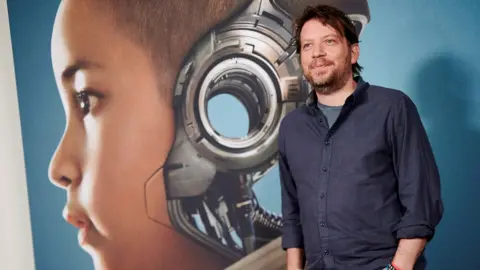 Getty Images
Getty ImagesHollywood director Gareth Edwards has always done things differently. Now his latest film has all the tech heads in Tinseltown talking.
Best known for blockbusters such as Rogue One: A Star Wars Story (2016) and Godzilla (2014), and now rumoured to be helming the next Jurassic Park movie, his sci-fi action film The Creator is in the running for best special effects and best sound at the Oscars next month.
The film sees John David Washington play Joshua, an ex-special forces agent, as a future war rages between humans and artificial intelligence (AI). The movie also stars Gemma Chan and Alison Janney.
Speaking to BBC Click's Spencer Kelly, Edwards says: "I used to jokingly refer to the style of the film [as] if Terrence Malik had sex with James Cameron and had a baby... that was the ultimate high benchmark of what this film was trying to do!"
Its impressive visuals - check out that huge military spaceship called The Nomad - have been widely praised, especially given the film had a budget of around $80m (£63m), a third of what a special effects-heavy movie like this would usually cost.
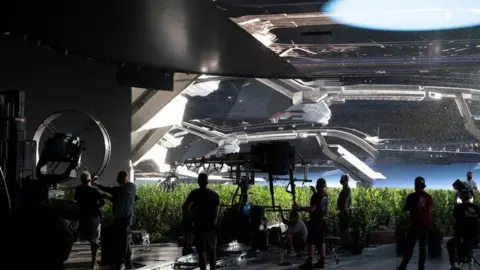 Oren Soffer, 20th Century, ILM
Oren Soffer, 20th Century, ILMWorking with pioneering studio Industrial Light and Magic (ILM), which was founded in 1975 in order to create the visual effects for Star Wars, British-born Edwards took inspiration from his first film Monsters (2010), an indy made on a tiny budget with a small team.
Most big films meticulously plan and build elaborate sets before shooting the majority of their special effects against a blue/green screen, which is hugely expensive.
But Edwards switched things up, shooting on location in countries including Cambodia and Thailand, then adding the special effects later.
Referencing Monsters, which had a crew of just six and also shot on location, Edwards says: "[I was] trying to get back to the positives of doing a guerrilla film.
"It's a way more efficient, exciting and interesting process. If you go to a location that's like the place in the scene and... if the crew is small enough, it's cheaper to fly anywhere in the world than it is to build a set.
"Whatever was the best place in the world we could find for that scene, we would go and shoot it there, knowing that in the computer afterwards, we can change things.
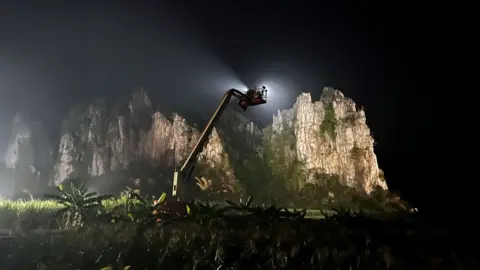 Oren Soffer, 20th Century, ILM
Oren Soffer, 20th Century, ILM"And [it] already looks good before you hand it over to the visual effects company."
Working that way has been made easier with recent advances in technology, Edwards explains.
"We tried to keep everything small and what allowed for that, which couldn't have happened five years ago, was that the camera technology had become really good."
A Sony FX3 camera was the tool of choice: "It's very cheap and small, I could just move with the camera. It was a massive, liberating thing."
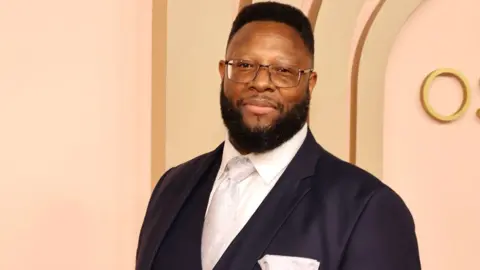 Getty Images
Getty ImagesThe careful choice of locations also helped keep the budget down.
"It looks bigger than your average film because every location is an Instagram destination," Edwards tells Kelly.
A significant chunk of The Creator was filmed in Thailand because "money goes a lot further there".
But creating a film in this way requires a lot of trust on behalf of the visual effects company, who come in at the tail-end of the project.
Edwards explains that he showed the early stages of the scenes to ILM so any misunderstandings could be ironed out quickly.
 Getty Images
Getty ImagesShooting on location was also an advantage for the cast.
Londoner Andrew Roberts was the on-set special effects supervisor for the film.
"It's great to have something real for the visual effects artists to build on top of, and also for the actors to be in a space where there is something real that can inform their emotion and their performances, rather than being surrounded by blue or green [screen] and being told to imagine."
The film has received much praise for its special effects, although some critics have not been quite as impressed with the storytelling itself.
The Guardian's Wendy Ide awarded it four stars, writing: "British director Gareth Edwards finally gets to make the sci-fi spectacular he was always destined to tackle.
"And with this ambitious, ideas-driven, expectation-subverting, man-versus-machines showdown, he has co-written and directed one of the finest original science fiction films of recent years."
But the Evening Standard's Hannah Strong had reservations, awarding it just two stars: "It's a handsome film and demonstrates the filmmakers' vivid imagination, but this doesn't quite extend to the story itself, or its dialogue which often veers into cheesy territory."
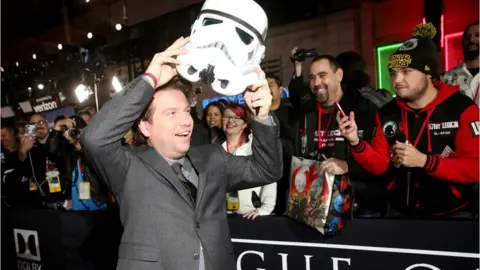 Getty Images
Getty ImagesFor Edwards, the film posed a different challenge to the likes of Rogue One, his last movie which came out eight years ago.
Reports claimed that Lucasfilm left Edwards out in the cold towards the end of the project, bringing in Tony Gilroy to write new dialogue and shoot extra scenes.
Edwards has disputed this, however, telling KRCW's The Business podcast that when Gilroy was brought in, they both worked together until the very end of the movie.
"Having done these massive franchises, there's pros and cons," Edwards tells BBC Click.
"The cons are you have this giant fanbase and all this pressure and you cannot fail; it had better be a massive hit because there's so many people waiting to see it.
"When you do an original science fiction [film], you've got the opposite problem - no-one's heard of it, no-one cares, you've got to educate the world about what it's about... why they should go and see it.
"It's a double-edged sword. [You're] trying to do something new but if it's too out there... I just made this stuff up in my head and everyone is helping me create it but what if I'm wrong and it doesn't work?"
'Proud parent'
Perhaps surprisingly given his pedigree, Edwards, who hails from Nuneaton, is his own worst critic.
"I always think I'm not pushing things enough, I always think I've conformed and sold out... I always look at my heroes and beat myself up. My heroes growing up were Spielberg, Lucas, James Cameron.
"We could go a lot further and do something more unique..." he trails off.
"[But] the day you get through a film, and everything about it was easy and fun and enjoyable, is the day you made your worst movie and you should probably retire."
And on The Creator's Oscar chances?
He modestly points out that he's not personally nominated as the recognition is for the visual effects team (Roberts, Jay Cooper, Ian Comley and Neil Corbould) and the sound crew.
"As a proud parent of the film, it's a nice end to the journey," he concedes.
Roberts adds: "I was born and grew up in the UK, my parents are from the Caribbean, a working class family and... to be at this point of being an Oscar nominee and potentially getting to win... I never could have dreamed this."
BBC Click's interviews with Gareth Edwards and Andrew Roberts will feature in the latest episode of the programme, which airs on the BBC News Channel at 0030 on Saturday 24 February.
